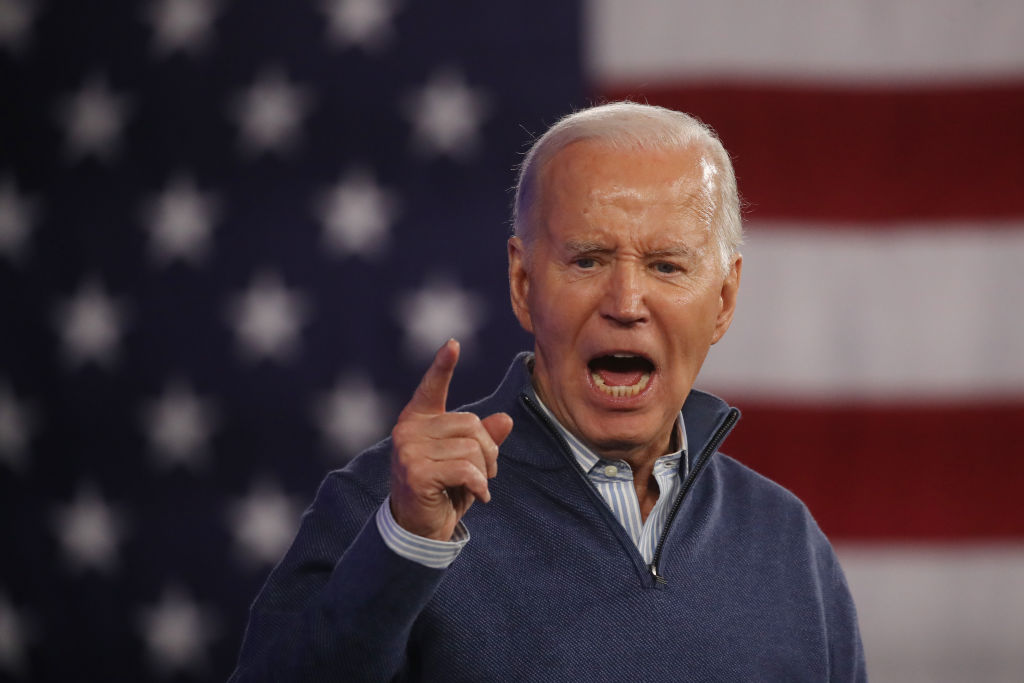“Our economy is the envy of the world!” boasted Joe Biden in his State of the Union address this month, effectively launching his re-election campaign. He went on: “15 million jobs in just three years — that’s a record! Unemployment at 50-year lows. 800,000 new manufacturing jobs in America and counting. Wages keep going up and inflation keeps going down!”
If “it’s the economy, stupid,” as Bill Clinton’s political strategist James Carville famously put it during the 1992 election, you’d think the President would be a shoo-in. Except that people aren’t buying it. Polls and betting markets give Trump a clear edge in November’s election. Rather than credit Biden for an economy which is leaving America’s G7 peers in the dust, many voters are looking back nostalgically to his predecessor’s time in charge.
New data shows that Americans are still shaken up by the inflation surge of the pandemic, and the ham-fisted way central banks dealt with it. The US Federal Reserve allowed prices, including asset prices, to soar into orbit and then — when it realised its mistake — clamped down hard with punishing rises in interest rates. So now voters face higher prices, more expensive homes, and mortgage rates that suck up more of their income.
While it’s all well and good for Biden to tell Americans that inflation is coming back down, his basic problem is that ordinary people don’t measure it the way economists do. To an economist, inflation is the rate of change in prices. To a typical consumer, it’s the level that matters. And what American consumers know for a fact is that prices today are much higher than they were two or three years ago, raising their cost of living.
Nor will it improve between now and election day. On the contrary, recent inflation reports point towards its levelling off in a 3-4% range rather than continuing down towards the 2% target the Federal Reserve has set. With oil prices recently breaking back above $80 for the first time since last year, Americans, who given their dependence on automobiles attach particular weight to the prices they pay at the gas pump, will face regular reminders of how expensive life has become. Stubborn inflation will also cause the Fed to delay interest-rate cuts, which means their mortgage rates won’t be coming down any time soon.
But if the situation looks bleak for Biden it’s not yet hopeless, because he has one ace he may yet be able to play. Prices won’t return to previous levels, but wages are currently rising faster than prices. Not by much, only about 1-2% annually. But should that continue, Americans will have a little more money left at the end of each month, and it will slowly accumulate. It would take a few years of such real wage gains for them to make up all the ground they lost during the pandemic. Nevertheless, if the trend continues they’ll have started to feel their belts loosening slightly come the November election.
What’s more, if interest rates stay high through the year, house prices will probably continue the decline they recently started. The cost of housing will also thus become gradually more bearable. So on a straight “are you better off than you were four years ago?” question, Biden won’t be able to beat Trump in November. But he may have a sufficiently plausible case for saying that if they stick with him, Americans will be better off in another four years than they would otherwise.
To use that old metaphor from American football, therein may lie the Hail Mary play that rescues his presidency.











Join the discussion
Join like minded readers that support our journalism by becoming a paid subscriber
To join the discussion in the comments, become a paid subscriber.
Join like minded readers that support our journalism, read unlimited articles and enjoy other subscriber-only benefits.
Subscribe